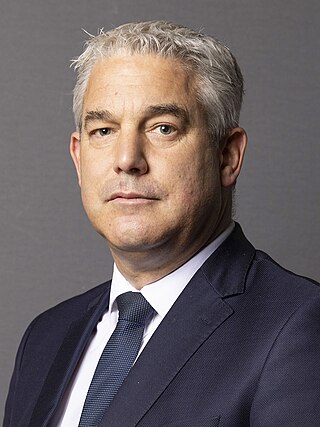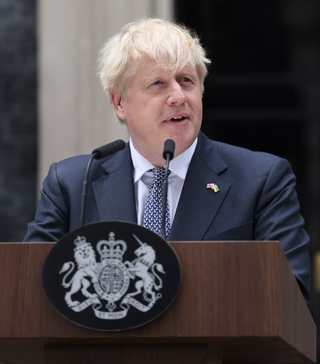
Christopher Ian Brian Mynott Philp is a British politician serving as Minister of State for Crime, Policing and Fire since October 2022. He previously served in Liz Truss's cabinet from September to October 2022 as Chief Secretary to the Treasury and then as Minister for the Cabinet Office and Paymaster General. A member of the Conservative Party, he has been the Member of Parliament (MP) for Croydon South since 2015.

His Majesty's Government is the central executive authority of the United Kingdom of Great Britain and Northern Ireland. The government is led by the prime minister who selects all the other ministers. The country has had a Conservative-led government since 2010, with successive prime ministers being the then-leader of the Conservative Party. The prime minister and their most senior ministers belong to the supreme decision-making committee, known as the Cabinet.

Stephen Paul Barclay is a British politician who has been the Secretary of State for Environment, Food and Rural Affairs since November 2023, having previously served in various cabinet positions under prime ministers Theresa May, Boris Johnson and Rishi Sunak between 2018 and 2023. A member of the Conservative Party, he has been Member of Parliament (MP) for North East Cambridgeshire since 2010.

Simon Anthony Hart is a British politician serving as the Chief Whip of the House of Commons and Parliamentary Secretary to the Treasury since October 2022. He previously served as Secretary of State for Wales in the Johnson government from 2019 to 2022. A member of the Conservative Party, he has been the Member of Parliament (MP) for Carmarthen West and South Pembrokeshire since 2010.

Gareth Alan Johnson is a British politician and former lawyer who served as Parliamentary Under-Secretary of State for Courts from September to October 2022. A member of the Conservative Party, he previously served as a Lord Commissioner of the Treasury from February to September 2022 and Assistant Government Whip from 2018 to 2019 and 2021 to 2022. Johnson was first elected at the 2010 general election as the Member of Parliament (MP) for Dartford, winning the seat from Labour. He has been supportive of Leave Means Leave, a Eurosceptic pressure group.

Sir James Jacob Gilchrist Berry is a British Conservative Party politician and former solicitor who has been the Member of Parliament (MP) for Rossendale and Darwen in Lancashire since the 2010 general election. He has previously served as Chairman of the Conservative Party and Minister without Portfolio from 6 September to 25 October 2022. He previously served as Minister of State for the Northern Powerhouse and Local Growth from 2017 to 2020 in the governments of Theresa May and Boris Johnson.

Helen Olivia Bicknell Whately is a British politician serving as Minister of State for Social Care since October 2022, and previously from 2020 to 2021. She also served as Exchequer Secretary to the Treasury from 2021 to 2022. A member of the Conservative Party, she has been Member of Parliament (MP) for Faversham and Mid Kent since 2015.

William James Quince is a British politician and former lawyer who served as Minister of State for Health and Secondary Care from September 2022 to November 2023. A member of the Conservative Party, he was first elected at the 2015 general election as the Member of Parliament (MP) for Colchester, defeating the incumbent Liberal Democrat MP Sir Bob Russell. From 2011 to 2016, Quince was a borough councillor in Colchester. On 9 June 2023, Quince announced he would not run as an MP at the next general election.

Anne-Marie Belinda Trevelyan is a British politician serving as Minister of State for Indo-Pacific under Rishi Sunak since October 2022. A member of the Conservative Party, she has been Member of Parliament (MP) for Berwick-upon-Tweed since 2015. She previously served in the Cabinets of Boris Johnson and Liz Truss.

Kevin John Foster is a British Conservative Party politician who has been the Member of Parliament for Torbay since 2015. He served as Minister of State for Transport from September 2022 until October 2022. Foster served under Home Secretary Priti Patel as Parliamentary Under-Secretary of State for Safe and Legal Migration from 2019 until September 2022.

Rachel Helen Maclean is a British politician who has been the Member of Parliament for Redditch in Worcestershire since 2017. A member of the Conservative Party, she currently serves as its Deputy Chairman for Women. She has previously served as Minister of State for Housing and Planning and has held ministerial roles in the Department for Transport and Home Office.

Joyce Rebekah "Joy" Morrissey is an American-born British politician who has served as the Conservative Member of Parliament (MP) for Beaconsfield in Buckinghamshire since 2019. Morrissey has been a Lord Commissioner of the Treasury since November 2023.

The first Johnson ministry began on 24 July 2019 when Queen Elizabeth II invited Boris Johnson to form a new administration, following the resignation of the predecessor Prime Minister Theresa May. May had resigned as Leader of the Conservative Party on 7 June 2019; Johnson was elected as her successor on 23 July 2019. The Johnson ministry was formed from the 57th Parliament of the United Kingdom, as a Conservative minority government. It lost its working majority on 3 September 2019 when Tory MP Phillip Lee crossed the floor to the Liberal Democrats. An election was called for 12 December 2019, which led to the formation of a Conservative majority government, the second Johnson ministry.

The second Johnson ministry began on 16 December 2019, three days after Boris Johnson's audience with Queen Elizabeth II where she invited him to form a new administration following the 2019 general election. The Conservative Party was returned to power with a majority of 80 seats in the House of Commons. Initially the ministers were largely identical to those at the end of the first Johnson ministry, but changed significantly in cabinet reshuffles in February 2020 and September 2021.

Boris Johnson carried out the first significant reshuffle of his majority government on 13 February 2020. Following the December 2019 general election, there was considerable speculation that Johnson was planning a major reshuffle of the Cabinet, to take place after the United Kingdom's official withdrawal from the European Union on 31 January 2020. There were reports that up to a third of the Cabinet would be dismissed, Whitehall departments abolished and civil servants replaced by policy experts; however, the reshuffle was smaller than expected and no departments were abolished. The anticipated reshuffle was nicknamed "The St Valentine's Day Massacre" in the press, due to its proximity to St Valentine's Day, the name being a reference to the 1929 gangland shooting in Chicago.
A list of events relating to politics and government in the United Kingdom during 2022.

Boris Johnson carried out the third significant reshuffle of his majority government from 5 to 8 July 2022, having last done so in September 2021. This was a direct result of the July 2022 United Kingdom government crisis in which more than a third of ministers and parliamentary private secretaries resigned from their positions.

In early July 2022, 62 of the United Kingdom's 179 government ministers, parliamentary private secretaries, trade envoys, and party vice-chairmen resigned from their positions in the second administration formed by Boris Johnson as Prime Minister, culminating in Johnson's resignation on 7 July. Johnson's premiership had been considered in danger for months after several scandals, but it was the Chris Pincher scandal that was identified to have spurred on the resignations. Considered the "last straw" for the Prime Minister, the scandal arose after it was revealed that Johnson had promoted his Deputy Chief Government Whip Chris Pincher, who was publicly facing multiple allegations of sexual assault, to the position despite knowing of the allegations beforehand.
The October 2022 Conservative Party leadership election was triggered by Liz Truss's announcement that she would resign as Leader of the Conservative Party and Prime Minister of the United Kingdom, amid an economic and political crisis.
















